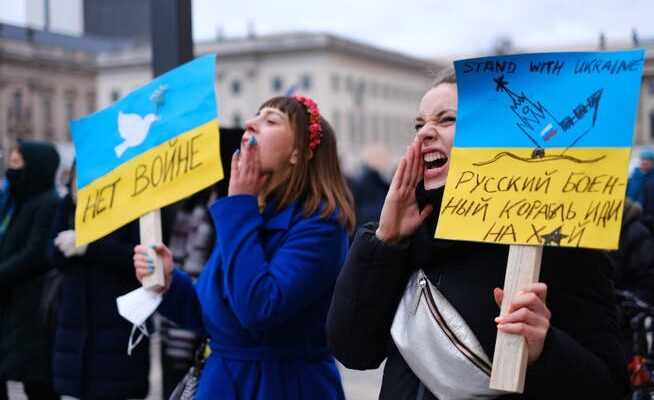Because the federal government does not want to impose an import ban on gas and oil from Russia, Ukrainian intellectuals compare it to the National Socialists. This is infamous.
Rally on Berlin’s Bebelplatz against the Russian invasion of Ukraine.

Hannah Bethke is an editor in the Berlin office of the NZZ.
You are reading an excerpt from the weekday newsletter “The Other View”, today by Hannah Bethke, editor of NZZ Germany. Subscribe to the newsletter for free. Not resident in Germany? Benefit here.
Suddenly Germany is catching up with the past. The old question of guilt is raised again from an unexpected source: the country is guilty for the second time in its history: against the Ukrainian people. This is what Ukrainian intellectuals write, among them the writer Katya Petrovskaya and the President of the PEN Club, Andrei Kurkov, in an open letter published in Die Welt to the German citizens and the federal government. As understandable as the authors’ anger is, their message is infamous.
The authors recall the historical guilt of the Germans in World War II, “when the Wehrmacht and SS destroyed the Slavic and Jewish population and deported millions of Ukrainians to Germany for forced labor”. Today, the Germans are again guilty, they say, because they ruled out an energy embargo against Russia.
It is not the first time that this accusation has been heard. The Ukrainian Ambassador Andri Melnik, who increasingly aggressively accuses Germany of inaction, has already attracted attention with comparisons to the National Socialist occupation of Ukraine.
Melnik knows the past-political consensus of the Federal Republic: never again war. The European peace order is based on this. The Ukrainian authors of the open letter also know this. Nevertheless, they write: «Dear Germans, aren’t you ashamed? If you don’t stop funding the attacker, you no longer have the right to say, ‘Never again!’” They are implying that Germany has learned nothing from its history.
An infamous comparison
No one fails to understand the seriousness of the situation. The Russian war of aggression against Ukraine is shaking the whole of Europe. Thousands of refugees are arriving in Germany every day. But shame and guilt are not categories from which a sensible policy can be derived. The suffering of the people does not justify the instrumentalization of history for current politics – certainly not by ignoring unwelcome historical alliances.
It wasn’t Chancellor Olaf Scholz, Economics Minister Robert Habeck or Foreign Minister Annalena Baerbock who laid flowers in front of the grave of a Nazi collaborator. Rather, it is the Ukrainian ambassador who is accused of visiting Stepan Bandera’s grave a few years ago and showering it with flowers.
During World War II, politician and partisan leader Bandera headed the Organization of Ukrainian Nationalists, which was involved in pogroms against the Jewish population. Bandera is considered an anti-Semite, fascist and war criminal. This is another reason why it is disgraceful to compare the efforts of the German government to de-escalate the current war with the crimes of the National Socialists.
Anyone who rejects this ahistorical accusation is by no means playing down Putin’s war crimes and imperial power behavior. Rather, the German Kremlin friendliness of the past few years points to a gap in the local politics of remembrance.
Putin’s regime cannot be adequately understood without knowledge of the history of the Soviet Union. However, the communist tyranny is evidently not anchored deeply enough in the collective memory of the Federal Republic. There is a formative awareness of the country’s National Socialist past. The crimes of Stalinism, on the other hand, are much less well known.
Criticism of political blindness
The Hitler-Stalin pact may only be dimly remembered in this country; he is of central importance for the history of Ukraine. Some, like the songwriter Wolf Biermann, compare Putin to Hitler. But what do Western Europeans know about Ukraine? Until recently, hardly anyone was interested in this country.
It is all the more bitter that the autocratic power structures in Russia were not recognized earlier by the German side in their fatal effects. Criticism of this political blindness is appropriate. Nevertheless, it would be fatal if all the achievements of the European peace order were thrown overboard within a few days – for example, if NATO intervened in the war, as Melnik vehemently demands.
Neither military intervention nor a gas embargo – which according to current calculations would endanger the supply of the country’s own population and industry – would be an act of reparation for the crimes committed by the Germans eighty years ago. Preventing an escalation and expansion of the war is not a denial of the past. It is the lesson of the history of two world wars.
